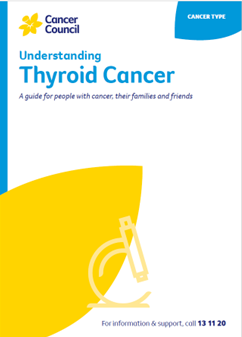- Home
- Thyroid cancer
- Diagnosis
- Staging and prognosis
Staging and prognosis for thyroid cancer
The tests previously described, help to work out whether you have thyroid cancer and if it has spread. This is called staging. It may not be possible to precisely stage thyroid cancer until after surgery.
Learn more about:
Overview
Staging with the traditional TNM system isn’t as helpful for thyroid cancer as it is for other cancers. This is because thyroid cancer usually has a good outcome, even if cancer has spread to the lymph nodes.
To help work out the best treatment for you, your doctor will classify the cancer as low, intermediate or high risk. They will consider the stage as well as the cancer type and growth pattern, whether the tumour is growing into blood vessels, and your age and general health.
Staging thyroid cancer
The TNM staging system is often used for thyroid cancer. TNM stands for tumour−nodes−metastasis. Each letter is assigned a number (and sometimes also a letter) to show how advanced the cancer is.
| T (Tumour) 0-4 | Indicates the size of the tumour. T1 cancers are smaller and remain inside the thyroid, while T4 tumours are larger or have spread to other parts of the neck. |
| N (Nodes) 0-1 | Indicates if the cancer has spread to the lymph nodes. N0 means the cancer has not spread to the lymph nodes; N1 means the cancer has spread to the nodes. |
| M (Metastasis) 0-1 | Indicates if the cancer has spread to other parts of the body, such as the lungs or the bones (metastatic or secondary cancer). M0 means the cancer has not spread; M1 means the cancer has spread. |
If you are having trouble understanding thyroid cancer staging and risk classification, ask a member of your treatment team to explain it in clearer terms.
Prognosis
Prognosis means the expected outcome of a disease. You may wish to discuss your prognosis and treatment options with your doctor, but it is not possible for anyone to predict the exact course of the disease. Your doctor can give you an idea of what may happen, based on statistics and common issues that affect people with the same type of thyroid cancer as you.
To work out your prognosis, your doctor will consider:
- your test results
- the type of thyroid cancer you have
- the size of the tumour and how quickly it is growing
- how well you respond to treatment
- other factors such as your age, fitness and medical history.
The most common types of thyroid cancer (papillary and follicular) have an excellent long-term prognosis, especially if the cancer is found only in the thyroid or in nearby lymph nodes in the neck. Even if the cancer has spread (metastasised), the outcome may often still be good.
Doctors may talk about 5-year survival rates. This is because research studies often follow people for 5 years, as cancer may be less likely to come back after that. It does not mean that you will survive for only 5 years. Thyroid cancer has a very high 5-year survival rate (97%).
→ READ MORE: Your health care team
Podcast: Tests and Cancer
Listen to more of our podcast for people affected by cancer
More resources
A/Prof Diana Learoyd, Endocrinologist, GenesisCare North Shore, Faculty of Medicine and Health, University of Sydney, NSW; Emeritus Professor Leigh Delbridge AM, The University of Sydney, Thyroid Surgeon, The Mater and North Shore Private Hospitals, NSW; Prof Ruta Gupta, Tissue Pathology and Diagnostic Oncology, Royal Prince Alfred Hospital and The University of Sydney, NSW; Susan Leonard, Cancer Nurse Coordinator Thyroid and Brachytherapy, Cancer Care Services, Royal Brisbane and Women’s Hospital, QLD; Dr Dean Lisewski, Endocrine and General Surgeon, Fiona Stanley Hospital and St John of God Hospital, Murdoch, WA; Caitriona Nienaber, 13 11 20 Consultant, Cancer Council WA; Jonathan Park, Consumer; A/Prof David Pattison, Deputy Director and Senior Staff Specialist, Department of Nuclear Medicine and Specialised PET Services, Royal Brisbane and Women’s Hospital and School of Medicine, University of Queensland, QLD; Prof Bruce Robinson, Endocrinologist, Co-Head, Cancer Genetics, Kolling Institute of Medical Research, The University of Sydney and Royal North Shore Hospital, NSW; Marissa Ryan, Team Leader (Cancer) Pharmacist, Princess Alexandra Hospital, Brisbane, QLD.
View the Cancer Council NSW editorial policy.
View all publications or call 13 11 20 for free printed copies.
Need to talk?
Support services
Coping with cancer?
Ask a health professional or someone who’s been there, or find a support group or forum
Looking for transport, accommodation or home help?
Practical advice and support during and after treatment
Cancer information
Dealing with the diagnosis
Common reactions to a cancer diagnosis and how to find hope
Resource hub
Guides, fact sheets, videos, podcasts and more for people with cancer, their families and friends

